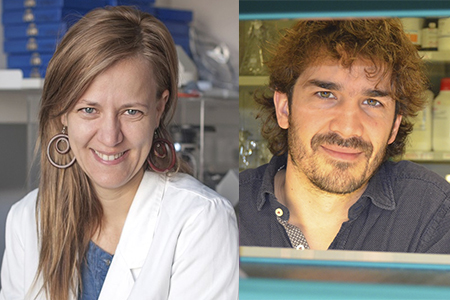Welcome, Oriol Gallego and Ana Janic!
Welcome, Oriol Gallego and Ana Janic!

The new research groups at the Department of Experimental and Health Sciences have been settled in. The group led by Oriol Gallego, previously at the IRB, is called Live-cell structural biology. Ana Janic, from the Walter and Eliza Hall Institute (Australia), leds the Cancer Biology group. The two PIs are filling the Junior Group Leaders Tenure Track positions at the Department.
Oriol Gallego, Live-cell structural biology
The Live-cell structural biology group is focused on the quantitative characterisation of complex molecular processes that regulate cell growth, both from a mechanistic and structural point of view. The main target of their studies is vesicle trafficking and their favourite model organism is the budding yeast. They combine cell engineering, advanced light microscopy, biochemical approaches and data integration in silico to analyse the concerted action of protein complexes that build supra-assemblies. When needed, they also develop new microscopy approaches to visualise those processes that could not be described before.
Ana Janic, Cancer Biology
The tumour suppressor p53 is the most frequently mutated gene in human cancer. The importance of p53 in tumour suppression and its role in the response of malignant cells to anti-cancer agents have driven the development of strategies to target the p53 pathway in cancer therapy. The Cancer Biology research group is focused on understanding the complexity of the p53 network in tumour suppression in different contexts. They use mouse models, genomic and biochemical approaches to investigate how p53 protects us from developing cancer.
